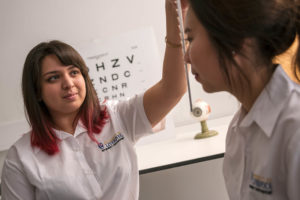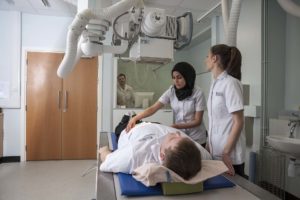Occupational Therapy
UCAS code B920
- Study mode
- Full-time
- Duration
- 3 years
- Start date and application deadlines
-
- Start date
UCAS code B920
Our Occupational Therapy programme is stimulating and rewarding, delivering a breadth of person-centred practical experience in a region with a particularly diverse population, providing an invaluable insight into a student's potential future career.
The Occupational Therapy programme at Liverpool will equip you with a range of both academic and practical skills for a rewarding career that enhances the quality of life for people encountering physical, emotional, social and cognitive challenges.
You will be taught by respected academics with a breadth of clinical and research experience and will graduate with up-to-date knowledge. You will learn about the human body and use the impressive Human Anatomy Resource Centre. This knowledge will help you learn about disease and disability and how they impact on the ability to engage in everyday meaningful occupation.
Throughout the three years you will undertake clinical placements. We have extensive connections with a diverse range of clinical specialties in physical and mental health and learning difficulties, for all age groups from young children to the elderly, in our student placements. There are also opportunities for you to study abroad. In addition, there are opportunities for elective and role emerging placements.
More than 1,000 hours of clinical experience, together with the theoretical knowledge gained from the programme, will enable the Liverpool graduate occupational therapist to competently analyse the psychosocial, physical and environmental factors in the lives of the people in their care and devise appropriate interventions to help them.
The programme is approved by the Health and Care Professions Council (HCPC) and is accredited by the Royal College of Occupational Therapists (RCOT). The programme also has approval from the World Federation of Occupational Therapy (WFOT). Recognition of the programme by the RCOT and WFOT are important for graduates seeking international job opportunities.
During your three years you will engage in modules which are framed within four themes. These themes explore the person, occupation and environment relationship, which is a core underpinning philosophy for the practice of occupational therapy. They are:
As a requirement for qualification you will experience a minimum of 1,000 hours practice placement education. Placements are integrated within each of the three years of the programme and are undertaken in a variety of health and social care settings.

We’re proud to announce we’ve been awarded a Gold rating for educational excellence.

We want you to feel welcome from the moment you apply to study at Liverpool. We offer lots of support for our students who are moving from abroad. We can welcome you at Manchester Airport with our meet and greet service (for September starts) and we have a friendly International Advice and Guidance team who run events to welcome you on to campus and provide in person support and events all year round.
Discover what you'll learn, what you'll study, and how you'll be taught and assessed.
The aims of year one are to provide you with the opportunity to:
Programme details and modules listed are illustrative only and subject to change.
The aims of year two are to provide you with the opportunity to:
Programme details and modules listed are illustrative only and subject to change.
The aims of year three are to provide you with the opportunity to:
It may be possible to undertake a placement overseas as an elective personal choice in year three.
Programme details and modules listed are illustrative only and subject to change.
Learning is promoted through a wide variety of activities that enable the students to become autonomous and continuous learners. Interactive lectures, practical and clinical skills group work, directed study, role play, problem-based learning, small group work, student-led seminars, collaborative project work and interactive tutorials are key learning strategies of the programmes. Practical work using our imaging suite digital equipment, the Clinical Skills Resource Room and the Human Anatomy Resource Centre complement teaching activities.
Face-to-face interactions between all students will occur at shared lectures, tutorials and group work and online interaction will be encouraged and facilitated. There is also inter-professional education and learning opportunities across all Healthcare Professions programmes.
Using a mixture of coursework and examination, a range of assessment methods can be seen across the programmes. These include seen and unseen written examinations, essay assignments with specific word lengths, multiple choice questions, case study presentations, video analysis and interactive practical examinations. Assessment of the work-based learning element of all programmes is an important aspect. You will be required to communicate your views orally and in written form; analyse, implement and evaluate your practice; and to extend the research and evidence base of your chosen profession.
The various methods of assessments have been chosen to provide a balance that will permit the undergraduates to demonstrate their intellectual abilities in all areas to the full.
We have a distinctive approach to education, the Liverpool Curriculum Framework, which focuses on research-connected teaching, active learning, and authentic assessment to ensure our students graduate as digitally fluent and confident global citizens.
The Liverpool Curriculum framework sets out our distinctive approach to education. Our teaching staff support our students to develop academic knowledge, skills, and understanding alongside our graduate attributes:
Our curriculum is characterised by the three Liverpool Hallmarks:
All this is underpinned by our core value of inclusivity and commitment to providing a curriculum that is accessible to all students.
Studying with us means you can tailor your degree to suit you. Here's what is available on this course.
University of Liverpool students can choose from an exciting range of study placements at partner universities worldwide.
Spend a summer abroad on a study placement or research project at one of our worldwide partner institutions.
Every student at The University of Liverpool can study a language as part of, or alongside their degree. You can choose:
Occupational Therapy students benefit from the School of Allied Health Professions and Nursing‘s experience in delivering over 100 years of dynamic, research-led teaching. Our student satisfaction rates, which range from 93-100%, are testament to our School being a great place to start to your career.





From arrival to alumni, we’re with you all the way:
It's amazing how quickly the practicals come into play, within the first two weeks we were talking with patients and out on placements. I am loving the course, I think it's fantastic. I know that I'm going to get a job at the end of it. Liverpool offers an amazing place to study and a wonderful city to come to.

Want to find out more about student life?
Chat with our student ambassadors and ask any questions you have.
Occupational Therapy graduates are eligible to apply for membership of the Health and Care Professions Council (HCPC), the Royal College of Occupational Therapists (RCOT) and the World Federation of Occupational Therapy (WFOT) to work outside the UK.
You can work in a variety of settings including:
99% of School of Allied Health Professions and Nursing students find their main activity after graduation meaningful.
(Graduate Outcomes, 2018-19.)
Your tuition fees, funding your studies, and other costs to consider.
Full-time place, per year - £9,535
Year abroad fee - £1,385 (applies to year in China)
Full-time place, per year - £32,000
Year abroad fee - £16,000 (applies to year in China)
Please note, UK full-time fees, year abroad and year in industry fees are for the academic year 2025/26. 2026/27 fees have yet to be confirmed. Please be advised that tuition fees are subject to increase each year, subject to the government’s regulated fee limits.
Tuition fees cover the cost of your teaching and assessment, operating facilities such as libraries, IT equipment, and access to academic and personal support. Learn more about paying for your studies.
We understand that budgeting for your time at university is important, and we want to make sure you understand any course-related costs that are not covered by your tuition fee. This includes the cost of stationery and equipment, professional association fees, and travel to placements. Students can choose to undertake a placement overseas that would incur additional costs.
Students should expect to cover the following costs.
Stationery and equipment
Professional association fees
Optional (but strongly recommended) Royal College of Occupational Therapists fee. The cost to join is £60 per year / £5 per month.
Travel to placements
Students will complete 33 weeks of placement experience. Most clinical placements are a daily commute (students are placed within 50 miles of the University). Student concessions are also available from local travel companies.
Additional accommodation costs apply for students wishing to complete a placement in the Isle of Man at the cost of £343 per month (placement lengths vary from 4- 8 weeks)
Elective placements
Elective placement (6 weeks in semester two, year three) is mandatory. The same travel costs will be incurred as those on a clinical placement.
Students can choose to complete placements in the UK or abroad (these are self-funding).
*Home students are able to apply for reimbursement of travel/accommodation costs in relation to placement from the NHS Business Services Authority.
We offer a range of scholarships and bursaries that could help pay your tuition and living expenses.
If you’re a high-achieving international student starting an undergraduate degree with us from September 2024, you could be eligible to receive a fee discount of up to £5,000. You’ll need to achieve grades equivalent to AAA in A levels. Most of our undergraduate degrees are eligible, with the exception of clinical programmes in Medicine and Dental Surgery.
Completed a Kaplan Digital Pathways Foundation Certificate? We’re offering a £5,000 fee discount off the first year of undergraduate study for a maximum of two high achieving students joining one of our non-clinical degrees from an online Kaplan Foundation Certificate.
Apply to receive tailored training support to enhance your sporting performance. Our athlete support package includes a range of benefits, from bespoke strength and conditioning training to physiotherapy sessions and one-to-one nutritional advice.
Completed a Foundation Certificate at University of Liverpool International College (UoLIC)? We’re offering a £5,000 fee discount off the first year of undergraduate study to some of the highest achieving students joining one of our non-clinical degrees from UoLIC.
We’re offering a £1,000 fee discount for years 2 and 3 of undergraduate study to eligible students progressing from University of Liverpool International College. You’ll need to be studying a non-clinical subject and get an average of 70% or above in year 1 of your degree.
If you’re a University of Liverpool International College student awarded a Kaplan Impact Scholarship, we’ll also consider you for an Impact Progression Scholarship. If selected, you’ll receive a £3,000 fee discount off the first year of your undergraduate degree.
Have a question about this course or studying with us? Our dedicated enquiries team can help.
Last updated 20 October 2025 / / Programme terms and conditions